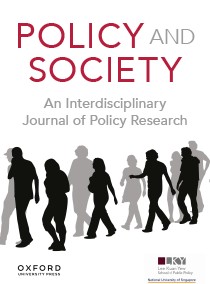The ideational robustness of liberal democracy in the wake of the pandemic: comparing the Danish and Swedish cases
IF 5.7
1区 社会学
Q1 POLITICAL SCIENCE
引用次数: 0
Abstract
The Covid-19 pandemic sparked unprecedented political responses dramatically affecting societies, markets, and the lives of individuals. Under great uncertainty and turbulent conditions, governments adopted far-reaching political interventions to curb the pandemic. These interventions might therefore be expected to challenge key ideas underpinning liberal democracy. We analyze and compare how the political interventions seeking to curb the spread of the coronavirus in Denmark and Sweden challenged and possibly adapted three key ideas underpinning liberal democracy, namely, constitutionality, parliamentarism, and public responsiveness. When ideas are adapted in ways that advance their ability to stay relevant when faced with turbulence, we understand them as robust. Our study found both similarities and differences between the two countries. The idea of constitutionality was challenged in Denmark but remained robust in Sweden. The idea of parliamentarism appeared robust in both countries, whereas the idea of public responsiveness was adapted in neither country but challenged further in Sweden than in Denmark. Paradoxically, Denmark saw fewer adaptations to the liberal democratic ideas than Sweden yet appeared better prepared to protect lives during turbulent times. Our study suggests that liberal democracies must very carefully balance trade-offs between individual liberties and the protection of public health to preserve the core public ideas of constitutionality, parliamentarism, and public responsiveness.大流行病后自由民主在意识形态上的稳健性:比较丹麦和瑞典的情况
Covid-19 大流行病引发了前所未有的政治反应,极大地影响了社会、市场和个人生活。在巨大的不确定性和动荡的条件下,各国政府采取了影响深远的政治干预措施来遏制疫情。因此,这些干预措施可能会对支撑自由民主的关键理念提出挑战。我们分析并比较了丹麦和瑞典为遏制冠状病毒传播而采取的政治干预措施是如何挑战并可能调整自由民主的三个关键理念的,这三个理念是:合宪性、议会制和公众响应。当这些理念在面临动荡时被调整以提高其保持相关性的能力时,我们就认为它们是稳健的。我们的研究发现了两国之间的相似之处和不同之处。合宪性理念在丹麦受到了挑战,但在瑞典却保持了活力。议会制的理念在这两个国家都显得稳健,而公众响应的理念在这两个国家都没有得到调整,但在瑞典比在丹麦受到了更多的挑战。矛盾的是,丹麦对自由民主理念的调整比瑞典少,但在动荡时期保护生命的准备却比瑞典充分。我们的研究表明,自由民主国家必须非常谨慎地平衡个人自由与保护公众健康之间的权衡,以维护宪政、议会制和公众响应等核心公共理念。
本文章由计算机程序翻译,如有差异,请以英文原文为准。
求助全文
约1分钟内获得全文
求助全文
来源期刊

Policy and Society
Multiple-
CiteScore
18.00
自引率
6.50%
发文量
43
审稿时长
30 weeks
期刊介绍:
Policy and Society is a prominent international open-access journal publishing peer-reviewed research on critical issues in policy theory and practice across local, national, and international levels. The journal seeks to comprehend the origin, functioning, and implications of policies within broader political, social, and economic contexts. It publishes themed issues regularly and, starting in 2023, will also feature non-themed individual submissions.
 求助内容:
求助内容: 应助结果提醒方式:
应助结果提醒方式:


